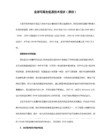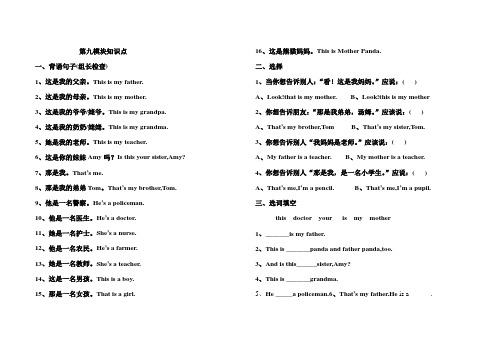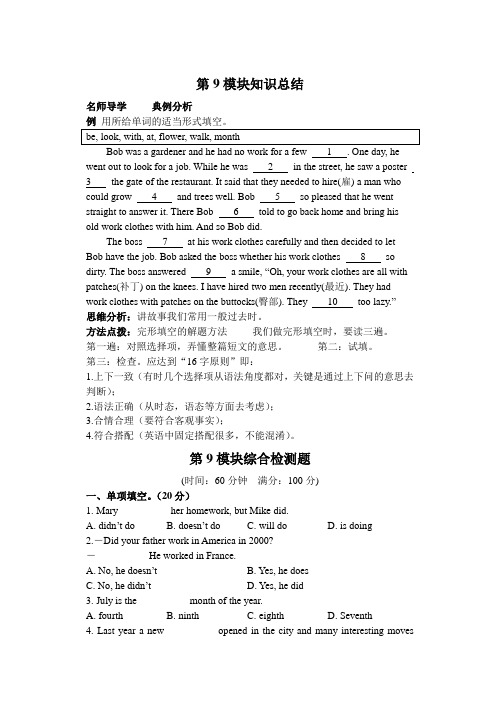第九模块总结性复习
- 格式:doc
- 大小:29.00 KB
- 文档页数:2



M9 Unit 3 The meaning of colour一、短语:Reading1.a unique identity 独一无二的身份2. more than just pieces of cloth 不仅仅是几块布3.sew up sth. 把……缝起来4.at random 随意;随机5. at the start of=at the beginning of 在…..初期6. suffer from hunger 遭受饥饿折磨7.lead to fundamental changes 带来根本性的变化8. remind sb of sth 提醒某人某事9. stand for liberty and justice 代表着自由和正义10.do sb justice = do justice to sb. 对某人公正11.to be honest = honestly speaking 老实说12.in salute to... 为向…致敬13. use the same colour as the French did 用与法国相同的颜色14. raise the tax rates in America to a high level 大幅提高美洲的税率15. pay for the conflict 支付战争的费用16. object to =be opposed to (doing) sth. 反对…17.increase control over... 加强对…的控制18.settle down 定居下来;安定下来19. take away their rights 剥夺他们的权利20. station soldiers 驻军21. demand separation from... 要求与…分离be separated from...= be divorced from... 与……分离/分开22. submit (oneself) to ... = resign oneself to sth 屈从;顺从submit sth to sb. 把某物提交给某人23.lead to sb doing sth. 导致某人做某事24. stand for hard work and justice 代表辛劳和正义25. fight for independence 为独立而战26. be lit by fireworks 被烟花照亮27. date back to...= date from... 追溯到;始于…(无被动,用现在时)28. be based on... 基于;以…为基础29. have a link with... 与……有关be associated with... be concerned with... be related to...... be connected with/to... be linked with/ to... in association/ connection with... have something to do with...30. be regarded as a symbol of purity 被视为纯洁的象征31. similarities and differences 异同点32. join up with... 联结;与…联合起来33.be willing/ unwilling to do sth. 愿意/不愿意做某事34.be outspoken about sth./ in doing sth. 对某事/做某事畅所欲言;直言不讳35.get one’s way 随心所欲36.split off from 分离; 脱离37.substitute A for B= substitute B with A 用A替换B after 根据……命名39. fall in love with...=lose one’s heart to... 爱上40. go white as a sheet 变得苍白41.be tickled pink 非常高兴42.be in the red 负债;赤字43.be feeling blue 痛苦;不高兴44.be green with envy 非常嫉妒45. die of starvation 饿死Task:1.in that 由于;因为now that 既然in case 万一;以防2.as long as = so long as 只要3.as if = as though 好像even if = even though 即使4.on condition that 以……为条件;只要5.make it 成功; 完成某事; 确定某个时间6.put one’s heart into sth. 全心全意投入于某事7.sth. be worth doing 某事值得做8. provide a clear description of 清晰的描绘Project:1. be arbitrary about 对……很随意2. a medium for 是…的媒介物3. be consistent with... 与……相一致;相符合be consistent in sth. 在……方面始终如一4.in good/high spirits 情绪好;精神状态好in poor/low spirits 情绪低落keep up one’s spirits 打起精神5.be disappointed at/ with by sth 对某事感到失望be disappointed in/ with sb./sth. 对某人/某事感到失望to one’s (great) disappointment 令某人十分失望的是6.be bound to do sth. 必然会;一定会做某事7.be occupied in doing sth= be busy doing sth. 忙于做某事occupy oneself with (doing) sth. 忙于做某事8.break into sp. 闯入;破门而入break in(vi.) 闯入;破门而入9.at the price/cost of ... 以……为代价10. care about 关心;在乎care for 喜爱;照料11..take caution 小心谨慎12.the most common colour in nature 自然界中最常见的颜色13.refer to someone with little experience 指缺乏经验的人14.in the black 银行里有存款15.make a profit 盈利;赚钱16.attend the funeral 参加葬礼17.get/be married (to sb) (与某人)结婚18.be influenced/ affected by... 受……的影响19.it is not appropriate to do sth. 做某事是不合适20.in some cases 在一些情况下21. carry/convey different meanings 承载着不同的意思22. The next time you choose your clothes 下一次你选择衣服时23. send the right message to sb 传递正确的信息给某人二、重要句型:Reading:1.这些旗帜不仅仅是用线随机缝在一起的几块布。

第九模块知识点一、背诵句子(组长检查)1、这是我的父亲。
This is my father.2、这是我的母亲。
This is my mother.3、这是我的爷爷/姥爷。
This is my grandpa.4、这是我的奶奶/姥姥。
This is my grandma.5、她是我的老师。
This is my teacher.6、这是你的妹妹Amy吗?Is this your sister,Amy?7、那是我。
That’s me.8、那是我的弟弟Tom。
That’s my brother,Tom.9、他是一名警察。
He’s a policeman.10、他是一名医生。
He’s a doctor.11、她是一名护士。
She’s a nurse.12、他是一名农民。
He’s a farmer.13、她是一名教师。
She’s a teacher.14、这是一名男孩。
This is a boy.15、那是一名女孩。
That is a girl. 16、这是熊猫妈妈。
This is Mother Panda.二、选择1、当你想告诉别人:“看!这是我妈妈。
”应说:( )A、Look!that is my mother.B、Look!this is my mother2、你想告诉朋友:“那是我弟弟,汤姆。
”应该说:( )A、That’s my brother,TomB、That’s my sister,Tom.3、你想告诉别人“我妈妈是老师。
”应该说:( )A、My father is a teacher.B、My mother is a teacher.4、你想告诉别人“那是我,是一名小学生。
”应说:( )A、That’s me,I’m a pencil.B、That’s me,I’m a pupil.三、选词填空this doctor your is my mother1、_______is my father.2、This is _______panda and father panda,too.3、And is this______sister,Amy?4、This is _______grandma.5、He _____a policeman.6、That’s my father.He is a ______.。

七年级下册第九模块知识点在七年级下册的学习过程中,第九模块是一个非常重要的模块。
本文将为读者介绍第九模块的知识点,包括语法、词汇和阅读理解等方面。
1. 动词的时态在第九模块中,我们学习了英语中的动词时态。
时态是指动词的形式和语境中所表示的时间的关系。
英语中有三个基本的时态:现在时、过去时和将来时。
除此之外,还有现在进行时、过去进行时、现在完成时、过去完成时和将来完成时等时态。
要正确地运用这些时态,需要掌握它们的用法和规则。
2. 数词和日期词在学习英语数词和日期词时,我们需要注意它们的用法和读法。
数词有基数词和序数词之分,其中基数词表示数量,序数词表示顺序。
日期词的用法与汉语有所不同,需要根据具体语境加以理解。
3. 形容词和副词形容词和副词是描述性的词语,用来修饰名词或动词。
在使用形容词和副词时,需要注意它们的位置和用法。
形容词通常置于名词前,而副词则位于动词、形容词或其他副词之后。
4. 阅读理解阅读理解是英语学习中的重要环节之一。
在第九模块中,我们需要学习阅读理解的技巧和方法,以便更好地理解和掌握文章内容。
在阅读理解时,需要注意文章的结构、关键词和逻辑关系等方面。
5. 写作写作是英语学习中必不可少的一部分。
在第九模块中,我们需要学习如何写作简单的英语句子和段落。
在写作时,需要注意句子结构、语法和修辞等方面。
总之,第九模块的知识点很多,需要我们精心学习和理解。
只有掌握了这些知识点,才能更好地掌握英语语言,更好地与国际社会进行交流。

第9模块知识总结名师导学典例分析例用所给单词的适当形式填空。
Bob was a gardener and he had no work for a few 1 . One day, he went out to look for a job. While he was 2 in the street, he saw a poster 3 the gate of the restaurant. It said that they needed to hire(雇) a man who could grow 4 and trees well. Bob 5 so pleased that he went straight to answer it. There Bob 6 told to go back home and bring his old work clothes with him. And so Bob did.The boss 7 at his work clothes carefully and then decided to let Bob have the job. Bob asked the boss whether his work clothes 8 so dirty. The boss answered 9 a smile, “Oh, your work clothes are all with patches(补丁) on the knees. I have hired two men recently(最近). They had work clothes with patches on the buttocks(臀部). They 10 too lazy.”思维分析:讲故事我们常用一般过去时。
方法点拨:完形填空的解题方法我们做完形填空时,要读三遍。
第一遍:对照选择项,弄懂整篇短文的意思。
Module 9 Great inventions【考点归纳】1. inv ention的词形变化:invent (v.t)创造,发明------> invention (n.) 发明------> inventor (n.) 发明家2. change (v.) 改变,变成常用短语:change … into…:把…变成…3. think of / think about / think over的辨别:think of…:想出,认为 / think about…:考虑,思考 / think over…:仔细考虑4. borrow 和 lend的短语辨别:① borrow:借来,借入------>常用短语:borrow…from…(从…借来…)② lend:借给,借出------->常用短语:lend…to…(把…借给…)() —How long may I ________ these books? —For a week. 【C】A. borrowB. to borrowC. keepD. lend5. visit的短语用法:①作动词:参观,拜访------> visit sb / visit someplace②作名词:参观,拜访------> be on a visit to… / pay a visit to… / make a visit to… (sb / sp)6. wait常用短语辨别:① wait for…:等待某人或某物②can’t wait to do sth:迫不及待地要去做某事7. 数量单位词hundred / thousand / million / billion的用法:①数字+数量单位词<单数> +名词复数:表示准确数量的…②数量单位词<+s> + of…:表示粗略数量的…8. since:自从…时起① since可以标志“现在完成时”;since引导的时间状语从句必须用“一般过去时”。
NSE 初中英语Book4第九模块复习一、Words and expressions.1、be good at 和 do well in 都有擅长于某事或干某事的意思,两者可以互换,如,:1) I am good at maths , physics and chemistry. 我擅长数、理、化。
I do well in maths , physics and chemistry. Physics [fiziks] 物理2) The girl is good at playing the piano. 这个姑娘擅于弹钢琴。
The girl does well in playing the piano.3) Yao Ming is good at playing basketball. 姚明擅长打篮球。
Yao Ming does well in playing basketball.根据所给汉语,完成句子。
1、这个姑娘能歌善舞。
The girl is . The girl does .2、我叔叔擅长古典音乐。
My uncle is .3、白求恩大夫擅长为伤兵做手术。
Dr Norman Bethune good at operations on injured soldiers.4、小说家擅于写小说。
The novelist novels.2i n order to 意思是“为了……”|后接动词原形,做目的状语,如:1) He studies very hard in order to pass the exam.为了考试合格,他非常努力学习。
so that 引导目的状语从句,如:2) He studies very hard so that he can pass the exam.他非常努力学习,以便考试合格。
3) He works hard so that he can support his family.为了支撑这个家,他努力地工作。
九上Module 9 知识要点梳理核心短语或句子1. think of想起2. take photos拍照3.put up张贴;悬挂4.wait for等待5. hear from收到……的来信6. more than超过;多余7. thousands of成千上万的8. get information on the Internet从网上得到信息9. take care of ( = look after)照顾;照料10. by e-mail通过电子邮件11. look through浏览12. look at看一看13. go to sleep去睡觉14. at a time一次15. by hand用手工(制造)16. as a result结果l7. in a way从某一角度18. in the future在未来19. be replaced by…被……所代替20.talk about谈论21. give a report做一个报告22. in the 1970s在20世纪70年代23. more and more people越来越多的人24. hundreds of成百上千的25. do research for为……做调查26. so that以便要点梳理1. inventv.发明;invention n.发明;inventor n.发明者。
2.borrow借来,borrow... from...“从,,借来,,”;lend借出,lend sb sth= lend sth to sb“把某物借给某人”。
borrow和lend为非延续性动词。
3. hear from= receive a letter from = get a letter from“收到,,的来信”。
4. information为不可数名词。
5. It's easy to do sth“做某事是容易的,,。
第9讲Problems学习目标一、掌握本单元重点单词短语;二、熟练掌握一般将来时的被动语态;.三、掌握表达强调句的方法。
知识串烧单词1.borrow [ˈbɒrəʊ] v. 借入,借来2.put up 张贴,公布3.website [ˈwebsaɪt] n. 网站4.mail [meɪl] n. 邮件,信件5.textbook [ˈtekstbʊk] n. 教科书,课本6.mainly [ˈmeɪnli] adv. 大部分地,主要地7.thousands of 好几千,成千上万8.page [peɪdʒ] n. 页,一页(纸)9.electronic [ɪˌlekˈtrɒnɪk] adj.电子的10.t echnology [tekˈnɒlədʒi] n. 科技,技术11.p owerful [ˈpaʊəfl] adj. 有影响力的,能控制他人的12.m emory [ˈmeməri] n. 存储器,存储量13.f ull [fʊl] adj. 満的,充满的14.f ix [fɪks] v. 修补,挽救15.i nstructions [inˈstrʌkʃənz] n.[复数]说明书16.l end [lend] v. (把某物)借出,借给(某人)17.p roperly [ˈprɒpəli] adv. 合适地,正确地18.l ook through 快速阅读,浏览19.p rinting [ˈprɪntɪŋ] n. 印刷20.a t a time 每次,一次21.b y hand用手,靠手做22.d evelopment [dɪˈveləpmənt] n. 发展,进步23.t rade [treɪd] n. 买卖,交易24.r esult [rɪˈzʌlt] v. (因…而)产生,发生25.s pread (spread, spread)v. 扩展,蔓延,传播26.i n a way 从某一角度,从某一点上看,在某种程度上27.c ompare … to … 把…比作28.i ntroduction [ˌɪntrəˈdʌkʃn] n. 引进,采用,推行29.a mount [əˈmaʊnt] n. 量,数量30.s tore [stɔ:] v. 存储,储藏31.v aried [ˈveərid] adj. 各种各样的,各不相同的32.f orm [fɔ:m] n. 种类,类型,形态,存在形式33.c onnection [kəˈnekʃn] n. 电话连接,计算机网络连接34.s ingle [ˈsɪŋgl] adj. 仅一个的,单个的35.d irection [dɪˈrɛkʃən] n. 方向36.r eplace [rɪˈpleɪs] v. 替换,取代37.w ait and see 等等看,等着瞧课文Unit 1 Will computers be used more than books in the future? Tony: Dad, can I borrow your camera?Dad: Why?Tony: I’d like to take some photos on the school visit to the museum next week. They’ll be put up on the school website. And they can be seen on the Internet by other classes, even people living in other countries.Dad: Sounds great! When I was at school, we waited for weeks to hear from our pen friends abroad. But today, we can send and receive photos and mails on the Internet, and it’s really fast.Tony: Yes, the Internet and the computer have changed our lives. We even use online textbooks in our class.I wonder… Will computers be used more than books in the future?Dad: Perhaps. In the past, we mainly got information from paper books. Some are huge ones with thousands of pages. Today, with the invention of the computer and the electronic technology, it’s easy to get information on the Internet. The Internet is more powerful than books.Tony: Anyway, about the camera…?Dad: Oh, yes. Here it is. I haven’t used it since your mum’s birthday. And the memory may be full. Tony: OK. That can be fixed. I’ve got an empty memory card. Where are the instructions?Dad: In the camera bag. It’s a gift from your mum for my birthday, so you must promise that you’ll take good care of it. if you have to lend it to anyone, tell them to use it properly.Tony: Promise!Unit 2 Will books be replaced by the Internet?Every morning, my father buys a newspaper on his way to work. Every day, I open my books in class and start my lessons. Every evening, my mother looks through magazines at home. And very night, I look at the photos of David Beckham and Yao Ming on my bedroom wall before I go to sleep. Can we imagine life without paper or printing?Paper was first created about 2,000 years ago in China. After its invention, people started to write on paper to make a book. In those days, books were only produced one at a time by hand. As a result, therewere not many books, and they were expensive. So, few people had the chance to learn to read.Printing was invented in China during the Sui and Tang Dynasties. Later, developments in printing made it possible to produce books more quickly and cheaply. A trade in books resulted, and more people learnt to read. Knowledge and ideas spread faster than ever before. In a way, we can compare the invention of paper and printing to the introduction of the Internet in the twentieth century.Although the Internet is still young, it is growing very fast, and may become more powerful than printing. A much larger amount of information can be stored on the Internet than in books. Someone with an Internet connection can find information much more easily than they can find in printed forms. And the machines we use to read it are now small and light, often smaller and lighter than a single book.Computers and the Internet are used in classrooms now, and newspapers and magazines are already read online. So what direction will traditional printing take in the future? Will books be replaced by the Internet? Let’s wait and see.语法一般将来时的被动语态一般将来时的被动语态表示将来要发生的动作和存在的状况且主语是动作的承受者。
第九模块总结性复习
亲爱的同学们,请你再次自我检查,看看这次能不都能全做对啊。
一、单词
麻烦事棒球错误队恐惧的冷的哭笑生气的大喊病了难过的高兴的
二、短语
一支棒球队在你们的头顶上戴帽子这些杯子
打棒球像这样做某事很简单犯错误
棒球游戏棒球帽从。
逃跑向下看向上看一只大鸟在树上在椅子底下在帽子上一只粉红的大猪在街上在椅子上三、知识点集锦
understand(过去式) what's(完全形式)laugh(现在分词) mistake(复数)look(过去式)funny(名词)
bring(反义词)cup(复数)head(复数)
bring(过去式)buy(过去式)think(过去式)
say(过去式)like(汉语意思)
将来时的句子结构1、be going to 2、;
用why 提问的句子用回答;现在进行时句子结构;What's the matter?同义句;
四、句子
1、怎么了?你们为什么笑?
2、我们打算建立一直棒球队。
3、你们头上为什么带着杯子?
4、我带了一些杯子。
5、我没有说杯子,我说的是帽子。
6、我想让你带着棒球帽来。
7、Amy 说棒球比赛要带杯子来。
8、因此我们现在要像这样去玩棒球。
9、英语很容易出错。
10、我用汉语也出了很多错误。
11、看我包里是什么!
12、怎么啦?你为什么没吃东西?因为我病了。
13、你为什么恐惧?因为有一条蛇。
14、它为什么在这里?应为它从动物园里逃出来了。
15、他为什么高兴?因为他有一支冰激凌。
16、他为什么伤心?因为他的风筝在树上。
17、他为什么感到寒冷?因为天下雪了。
18、帽子上有一个杯子。
19、看,来了一只粉红色的大猪。
20、我能看见在街上有三颗绿色的树。
21、这个球在椅子上还是在椅子下面?
五、造句
1.用It is easy to do sth 造六个句子
2、用It is difficult to do sth 造六个句子
3、用It is time to do sth 造六个句子
4、用It is useful for sb to do sth 造六个句子。